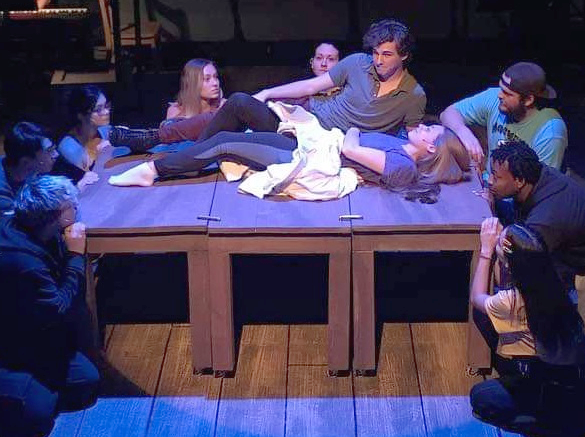
The stories behind “Spring Awakening,” the current Grossmont College Theatre Arts Department entry, unfold every day — just like they did in 1891, when Germany’s Benjamin Franklin Wedekind charted them under the name “Spring’s Awakening.”
Cascading hormones and the specter of child abuse hang over Wedekind’s drama on a group of wide-eyed teens and a cadre of parents whose immobile Victorianism disdains the biology behind – horrors! – sex. The apostrophe “s” may be gone, but the countless modern American parallels fueled the Broadway edition’s run to eight 2006 Tony Awards, including Best Musical (the 2015 revival won three more).
Enter the department, whose decision to mount the show is compelling amid the themes and the casts’ rough age similarities — here, both work to the department’s decided advantage. This is a very nice piece, steeped in the players’ thorough comprehension and their infectiously youthful spirit.
Adult repression of sexual evolution is no respecter of cultural shifts, they seem to say. Alas, the more things change . . .
At center is wunderkind student Melchior Gabor, whose starchy faculty dislikes him amid his search for answers to life’s colossal questions. He’ll lose two close chums to the ghastly grit of day, one beset with disturbing sexual fantasies and bad grades, and the other, whom he impregnated, the victim of an abortion gone bad.
The larger world, fueled by a legion of hopelessly doctrinaire adults (Melchior calls it a “parentocracy”), makes for a hideous home planet.
Wedekind had tapped a nerve in those for whom protection of public morals is a self-appointed task — the play didn’t even premiere until 1906 and didn’t receive its first turn in English until 1917. Its accelerating public acceptance eventually yielded an authentic sex act onstage, which at the time was major national news.
Here, there’s merely a mimic featuring partial male nudity, and you’ll almost miss it if you blink.
In any event, the play comes down hard on the side of the kids, victims of a societal assault in its uglier aspects. While Stephen Sater’s book and Duncan Sheik’s outstanding score have their funnier moments, they illuminate an American temperament whose ills number far beyond healthy adolescent curiosity.
Noah Filley’s Melchior has the histrionic range — his Melky is an agreeable, fair-haired boy who’s not afraid to defend what’s important, and Filley illustrates this through a solid voice register, especially in the touching “Those You’ve Known” and the comic-relief cast number “Totally F–ked.” Mia Apalategui succeeds very well in the same way with her beleaguered Wendla Bergmann, Melchior’s love interest.
The melancholy “Don’t Do Sadness” defines suicidal Moritz Stiefel — that’s part of the reason the acting honors go to Trevor Cruse. Moritz’s hangdog face and furrowed brow are plastered with the angst of the day, and Cruse’s voice and comportment are ideal complements to those traits.
Alex Lee and Martina Lopez have uncommon voices, but the household sexual abuse their Ilse Neumann and Martha Bessell endure (the harrowing “The Dark I Know Well”) calls for more edge from the characters. In this case, it’s Slater’s job to create it.
Michael McKeon’s collegial scene design invites the offstage players and seven topflight musicians to oversee the proceedings like so many curious patrons. The rest of the tech is fine, with Beth Duggan’s costumes establishing both the characters’ surface traits and their stated intents.
This is my third go-round with “Spring Awakening,” and this edition reminds me of a 2009 interview with Lauren Pritchard, who played Ilse in a Broadway company and now performs as singer/actor Lolo.
“Think about it,” she told me. “When you listen to your favorite singer or favorite band or whatever it is, you don’t want to hear the same album over and over. It’s fun to try avenues that you can still really be connected with.”
Establishing that connection is a potential problem in this play, because each scene is driven by such equally monumental revelations. No worries here, however. Director Meg DeBoard, choreographer Michael Mizerany and the cast ensure that the seams effortlessly fall into place, fueling the dramatic conflict that will see the show — and you — safely through the run.
This review is based on the opening night performance of March 14. “Spring Awakening” runs through March 23 at Grossmont College’s Stagehouse Theatre, 8800 Grossmont College Drive in El Cajon. $12-$15. 619-644-7234, grossmont.edu.













